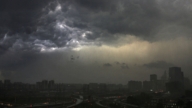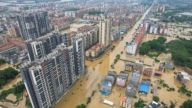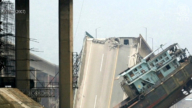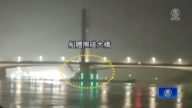【新唐人2012年11月24日訊】《外交學者》雜誌網站的一篇文章,預言中國未來10年,很可能遭遇重大經濟政治危機,甚至捲入軍事衝突,文章說,當年蘇聯突然解體,曾讓美國政府和中情局措手不及,為避免意外,他們應多了解中國存在的政治鬥爭、經濟增長減緩、與周邊國家領土爭端升級、環境災難、缺乏政改新思想等問題。文章說,中國如果出現意想不到的經濟崩潰或嚴重的政治危機,更別說是軍事衝突,到底影響會如何,這應該成為各國戰略規劃的一部分。
《外交學者》11月21號刊登「要為中共垮臺做好準備(Planning for China’s ‘Fall’)」文章,作者Michael Auslin是美國首府華盛頓特區美國企業研究所的學者。
文章指出,越來越多的中國問題觀察家已經發出警報,中國很多方面都陷入危機。作者列出清單,提醒全世界政府和政策分析家們,應該注意的事情。
第一、中共高層分裂和醜聞。作者表示,薄熙來案件透露了中南海內的權鬥和中共高層的驚人腐敗。
第二、是經濟增長放緩。中國經濟在今年(2012年)顯著放緩。據報導,2010年,中國全國各地發生了180,000起抗議和起義事件,疲弱的經濟無疑將給中國的社會和政治體系帶來嚴重壓力。由於中國面臨地方債務危機,大城市房地產市場越來越泡沫化,作者認為,地方債務和房地產泡沫化這兩者只要有一個崩潰,就可能對經濟增長帶來數不清的後果。同時,一胎化政策的惡果開始顯現,他說,本世紀中國將面臨嚴重的人口挑戰,勞動力的萎縮,在未來數年將拖纍經濟增長。
旅美中國民運人士蔡桂華:「經濟狀態是甚麼,物價奇高,收入和消費是不均等的,所以 在這種情況下,老百姓根本沒錢,你要拉動內需市場消費,根本就拉動不起來。」
《新唐人》特約經濟評論家傑森‧馬:「如果這個(經濟增長)緩慢開始下降了,一下降人民就受不了,另外地方財政,現在就是靠這種高速增長帶來的財政,養著地方官員的奢侈,一旦增長不夠了,那麼官員一方面收入不夠,官員可能徹底出現疲滯,這個團體就垮了,人心就散了。」
另外,無法解決的領土糾紛,是Michael Auslin提出的第三個中國面臨的危機。他表示,領土糾紛時間越長、越與民族主義示威相關,意外事件就越可能引發實際的衝突。雖然很難想像圍繞這些島嶼會發生全面戰爭的爆發,可是,即使是輕微的武裝衝突,所引發的政治和經濟負面後果,也足以讓人擔憂。
本週舉行的亞太峰會,就受到中國與其他國家的主權爭端影響,東南亞國家就如何應對中國不斷增強的主權立場,沒有達成一致。根據《金融時報》最近報導,中國在新版護照上印了包括南中國海在內的中國地圖,加強了主權立場,此舉激怒了和中國有主權爭端的鄰國。
《外交學者》的文章還提出,「正在形成的環境災難」,和「沒有推動改革的跡象」,都將成為中國社會動盪的根源。
文章最後說,如果中國在世界舞臺上越來越弱,軍中將如何應對?如果經濟增長繼續放緩,或債務負擔增加,未來幾年金融危機困擾中國,領導層會不會分裂?對這些問題,西方或亞洲政府應該密切關注。
作者表示,如果北京當局出現任何權力中斷、變弱或崩潰,都將對全世界產生深遠的影響。
採訪/朱智善 編輯/黃億美 後製/郭敬
Diplomacy Scholars: Preparing for China’s Fall
An article on the Diplomacy Scholars website predicted
that in the next 10 years, China is likely to face a significant
economic and political crisis, or even become involved
in a military conflict.
The article stated that the Soviet Union’s sudden disintegration
caught the U.S. government and the CIA off guard.
In order to avoid accidents, they could educate themselves
regarding the political struggle in China, economic slowdown,
increasing territorial disputes with neighboring countries,
environmental disasters, and the lack of new political reform ideas.
The article said that what kind of effects from China’s
unexpected economic collapse or serious political crisis,
let alone a military conflict should become part
of the national strategic planning.
Diplomacy Scholars published Preparing for China’s Fall
on November 21.
Its author, Michael Auslin, is a scholar
of the American Enterprise Institute in Washington, DC.
The article pointed out that more and more China observers
have issued an alert on the many aspects of China’s crisis.
The authors provided a list of issues that global governments
and policy analysts should pay attention to.
The first is divisions and scandals at the high level CCP.
The author believes that the Bo Xilai case revealed the power
struggle within Zhongnanhai and shocking corruption at the high level.
The second is the economic slowdown.
China’s economy slowed significantly this year (2012).
It has been reported that in 2010, there were 180,000 protests
and uprisings all over the country.
The weak economy undoubtedly put serious pressure
on China’s social and political system.
As China faces local debt crises and real estate market
collapses in major cities, the authors argued that
either local debt or a real estate crash will bring
untold consequences to economic growth.
Meanwhile, the bad consequences of the one-child policy
are starting to show.
He added, in this century, China will face serious
demographic challenges,
and the shrinking labor force will be a drag on
economic growth in the next few years.
American pro-democracy activists Cai Guihua: “Under
the current economic status –extraordinarily high prices
and income and consumption inequality, people simply
have no money.
If you want to stimulate domestic demand market
consumption, you will fail.”
Jason Ma, NTDTV’s special economic critic: “If the economic
growth begins to decline, people cannot handle it.
In addition, local revenues rely on this high-speed growth
to support the luxury of local officials.
When growth is lacking, the officials do not have
enough income.
Thus, officials may appear to be tired and this group
would collapse."
Michael Auslin pointed out that the third crisis China faces
is the irresolvable territorial disputes.
He said that the longer the territorial disputes, the more
nationalist demonstrations related accidents will occur.
Although it is difficult to imagine the outbreak of full-scale
war surrounding these disputes,
even a minor armed conflict could trigger worrisome
negative political and economic consequences.
The Asia-Pacific summit held this week was affected by
the sovereignty of China and other countries.
Southeast Asian countries have not reached an agreement
on how to deal with China’s growing sovereign stance.
Financial Times in the UK reported that recently the new
version of the passport from China, which includes
the South China Sea as its territory to strengthen
its sovereignty stance, has angered China’s neighbors.
In the article, Michael Auslin also suggested that
“environmental disasters" and “no signs to promote reform”
will become a source of social unrest in China.
At the end of the article: If China is getting weaker
on the world stage, how will the military handle it?
If economic growth continues to slow, the debt increases,
or there’s a financial crisis in the next few years, will the leadership level then split?
Both western and Asian governments should pay
close attention to these problems.
The authors said that if the Beijing authorities exhibit
any power interruption, weakening or collapse, it will have a profound impact on the world.




























